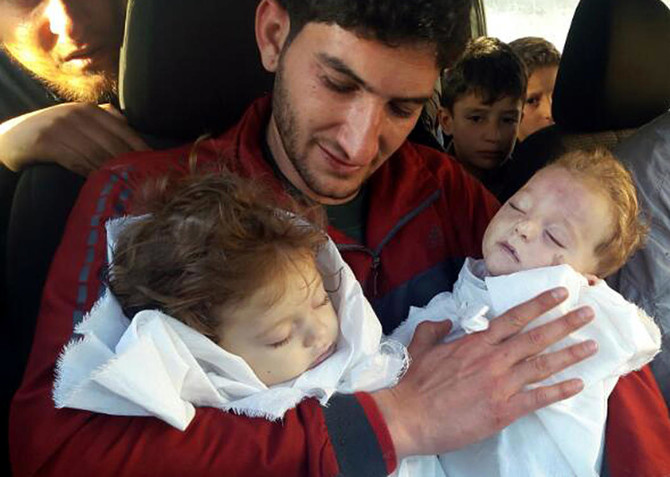AMSTERDAM: The world’s chemical weapons watchdog said the banned nerve agent sarin was used in an attack in northern Syria in April that killed dozens of people, a report from a fact-finding team seen by Reuters on Thursday showed.
The report was circulated to members of the Organization for the Prohibition of Chemical Weapons (OPCW) in The Hague, but was not made public.
The attack on April 4 in the town of Khan Sheikhun in northern Idlib province was the most deadly in Syria’s civil war in more than three years. It prompted a US missile strike against a Syrian air base, which Washington said was used to launch the strike.
After interviewing witnesses and examining samples, a fact-finding mission (FFM) of the OPCW concluded that “a large number of people, some of whom died, were exposed to sarin or a sarin-like substance.
“It is the conclusion of the FFM that such a release can only be determined as the use of sarin as a chemical weapon,” a summary of the report said.
“Now that we know the undeniable truth, we look forward to an independent investigation to confirm exactly who was responsible for these brutal attacks so we can find justice for the victims,” US Ambassador to the UN Nikki Haley said in a statement on Thursday.
A joint UN and OPCW investigation, known as the JIM, can now look at the incident to determine who is to blame, she said.
The JIM has found Syrian regime forces were responsible for three chlorine gas attacks in 2014 and 2015 and that Daesh militants used mustard gas.
Western intelligence agencies had also blamed the regime of Bashar Assad for the April chemical attack. Syrian officials have repeatedly denied using banned toxins in the conflict.
The mission was unable to visit the site itself due to security concerns and will not attempt to get there, the head of the OPCW was said to have decided.
The report is based on “doubtful evidence,” Russian news agencies quoted Russia’s Foreign Ministry as saying on Friday.
“Unfortunately, after a first reading of this document we are forced to note that its conclusions are based on extremely doubtful evidence,” TASS news agency quoted Russia’s Foreign Ministry as saying.
“The contents of the report compiled by a special commission of the OPCW, are largely biased, which makes us think that the activities of this structure serve a political order,” TASS quoted the ministry as saying.
Moscow has said the attack was carried out by Assad’s opponents, who, Russian officials alleged, made it look as though it was the work of government forces.
Russian Foreign Minister Sergei Lavrov said on Thursday the report does not back claims by the US and its allies that the substance was dropped from aircraft.
He said: “The report released by the OPCW said they were not sure that the sarin found there had been airdropped in bombs. They don’t know how the sarin ended up there, yet tensions have been escalating for all these months.”
British Foreign Secretary Boris Johnson urged the international community to work together to bring to justice those responsible for the April 4 nerve gas attack in Syria.
Johnson said: “This confirmation cannot be ignored.”
While the OPCW report did not apportion blame, Johnson said: “The UK’s own assessment is that the Assad regime almost certainly carried out this abominable attack.”
He added: “I urge our international partners to unite behind the need to hold those responsible for this atrocity to account.”
Syria joined the chemicals weapons convention in 2013 under a Russian-US agreement, averting military intervention under then US President Barack Obama.
The US said on Wednesday the Syrian regime appeared to have heeded a warning this week from Washington not to carry out a chemical weapons attack.
Russia, the Syrian regime’s main backer in the civil war, warned it would respond proportionately if the US took pre-emptive measures against Syrian forces after Washington said on Monday it appeared the Syrian military was preparing to conduct a chemical weapons attack.


Sarin used in April attack, says chemical weapons watchdog
Sarin used in April attack, says chemical weapons watchdog

Egypt’s prime minister heads to Washington for Trump Peace Council meeting

- Madbouly is attending on behalf of President Abdel Fattah El-Sisi and is accompanied by Foreign Minister Badr Abdelatty
CAIRO: Egypt’s Prime Minister Mostafa Madbouly headed to Washington on Tuesday to participate in the inaugural meeting of a “Peace Council” established by US President Donald Trump, the cabinet said.
Madbouly is attending on behalf of President Abdel Fattah El-Sisi and is accompanied by Foreign Minister Badr Abdelatty.
© 2026 SAUDI RESEARCH & PUBLISHING COMPANY, All Rights Reserved And subject to Terms of Use Agreement.











